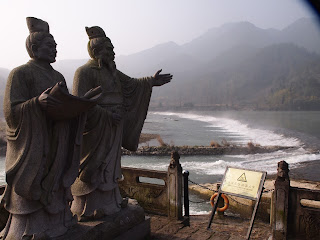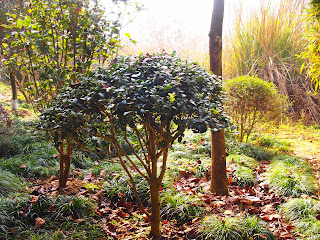Ancient Weir Artist Colony
by Marianne Peel Forman
You could not know.
You
did not see the fog settled
In
the bamboo grove
Merging
with my breath, my breathing,
Cold
and determined clouds,
Air
fusing with air.
My
hands this morning
In
two shivering pockets.
I
have no fur to zipper into this coat
And
the pockets are fold on fold of nylon acetate.
I
want gloves with warm tunnels for my fingers.
You
could not know.
You
did not smell the sizzle of dumplings
The
plate of pickled vegetables
Red
peppers and chilis she offered me on a wooded spoon
Fire
adhered to my lips, a sunrise burning into the grey morning.
You
could not know.
You
did not hear the lady of the lake
Humming
a morning song as she soothed and rubbed her face, shoulders,
Even
the bob of her breasts
With
hair released from clasps, free from braids.
You
could not know.
You
did not see the potter down by the river
Hands
shaping clay
Seducing
curves and indentations with thumb and forefinger.
He
is alone by the river, breathing mist onto the vessel in his hands.
You
could not know.
You
did not see the jagged edge
Where
the stone poet raised his arm,
Silently
urging me to huddle in the cove of his chest,
There,
down by the waters.
“Listen
to the rhythm here,
Buried
deep beneath skin and muscle and sinew.
Listen
down to the marrow place.”
He
tells me, “I cannot sleep, ever. This
pulsing
Keeps
me awake.”
And
then he takes my hand,
Eases
it gently behind his gown,
into
the warm liquid surrounding the beating.
“Take
my heart in your hands. Massage it
softly,
But
with steady rhythm. So that I may sleep.”
And
so in the fog of the bamboo grove,
I
hold this poet’s beating heart.
I
once held a frightened sparrow in my hands.
This
heart is that winged creature, fluttering in my palms.
And
I watch the poet’s eyes close, tranquil in the fog.
We visited the Ancient Weir House of Painting, an artists' colony/retreat, on a very cold and foggy morning. A beautiful place filled with bamboo groves and waters and paths easy on the stepping and exploring.
We were told by Professor Mung that artists came here to paint, all with the idea of selling their work to Europeans and Americans. As I read more about this place, especially in an article in The New Yorker, I discovered that the artists, at one time, churned out paintings that would sell. Scenes of Venice, apparently, were very popular. Buyers wouldn't necessarily come to the colony; rather, their paintings would be taken to auction sites for buyers.
Another fascinating connection I discovered was that a man from Guizhou Province, where Scott and I have taught, was one of the main paint mixers at this colony.
There is some indication that this place is now used more as a genuine artists' retreat. I felt very at home here, in this tranquil yet working space. I could write here, work here, among the bamboo groves and the statues of revered Chinese poets. A peaceful, tranquil place...
I did not want to leave...
Namaste,
Marianne
P.S. If you'd like to read the fascinating article about Weir Painting House in The New Yorker, go to the following link: http://www.newyorker.com/magazine/2009/10/26/chinese-barbizon.





























































No comments:
Post a Comment